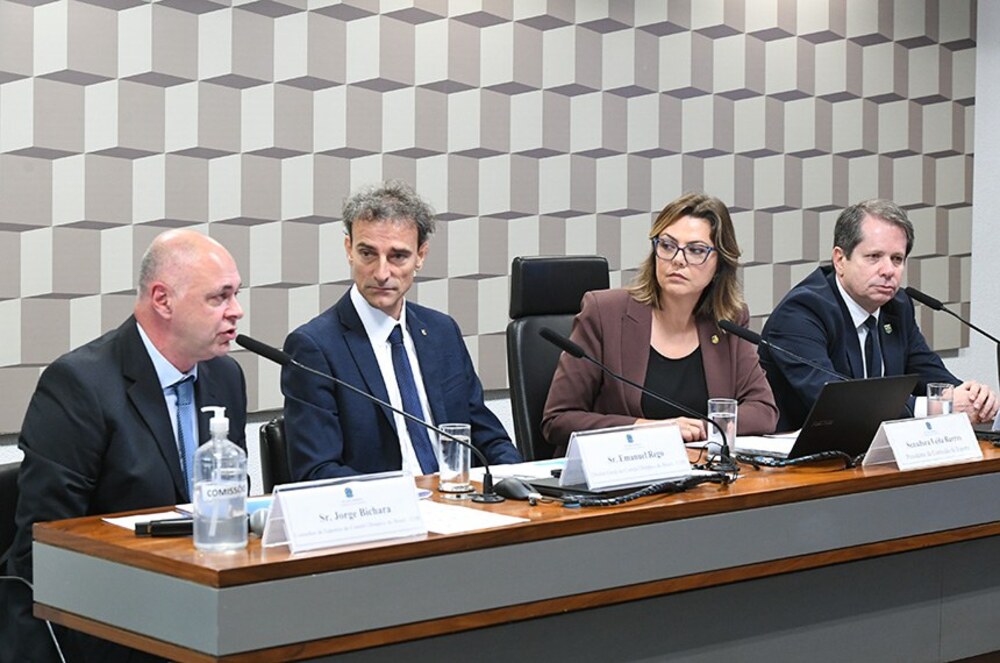Brazil: Olympic Committee Requests Increase in Public Funds

Brazil, June 12, 2025 — www.zonadeazar.com — Representatives of the Brazilian Olympic Committee (COB) presented to the Sports Committee (CEsp) on Wednesday (11) the results of the use of public funds received and pointed out the need for more investments.
The meeting was held at the request of Senator Leila Barros (PDT-DF), chair of the committee (REQ 15/2025 – CEsp). According to her, there needs to be greater mobilization of athletes to support the approval of laws that benefit the sector.
“Those athletes who are doing well have an obligation to contribute to defending the sector that helped shape them. We’re not trying to make athletes appear politicized — they’re there for performance — but the movement really needs the awareness that this work is not about getting political; it’s about fighting for rights,” she said.
Leila questioned COB president Marco Antônio La Porta about the use of approximately R$20 million from sports betting revenue transferred to the organization. According to La Porta, there are no regulations on the use of these funds under the current sports betting framework. He expects part of these funds to offset the decline in lottery revenue. Since 2001, with the Agnelo Piva Law, lottery funds have represented a significant portion of the committee’s revenue, averaging R$450 million per year.
“We understand that the people who bet on lotteries are aging, and now a new generation is betting on sports betting. That’s why betting resources are so important for sports. What’s missing is establishing the rules on how we can use them. In July, we expect deposits from other companies. If we don’t have the rules, it will just sit in the vault,” said La Porta, who took office in January.
More Resources
La Porta said that COB’s new administration is working “aggressively” to attract sponsorships from the private sector, so as not to depend solely on government transfers. COB’s general director, Emanuel Rego, stated that for this year, the committee secured new sponsorships and updated its revenue forecast to more than R$67 million. Still, according to him, the entity’s budget will face a deficit of R$5 million. Emanuel Rego argued for more public funds.
“Sports always need more resources. Every real invested in sports is well used. The more resources, the better the results,” said Emanuel, a former volleyball athlete and husband of Senator Leila.
COB’s general director stated that the Federal Court of Accounts (TCU) has full access to the entity’s financial management system to oversee the use of public funds.
Confederations
According to COB sports consultant Jorge Bichara, one of the reasons investing in sports in Brazil is more expensive than in other countries is logistical challenges.
“Brazilian sports work miracles given the tough international competitiveness. We live at the ‘edge of the world,’ on the edge of the globe. Logistics costs triple or quadruple to maintain a competitive level with the world’s leading countries. This makes administrative management very challenging for COB,” he said.
Bichara stated that Brazilian sports confederations linked to COB have improved in good practices in resource management and transparency regarding the funds received from COB. Transfers to cover athletes’ preparation, for example, follow administrative and technical criteria. According to him, R$265 million should be transferred to the confederations, with the biggest beneficiaries being gymnastics, volleyball, and judo.
Programs
The COB president told CEsp that since the Agnelo Piva Law, Brazil has won 104 Olympic medals in 23 years, compared to just 66 in the 81 years prior to the law. However, Emanuel stated that the current model for supporting high-performance athletes needs improvement. He said that under his management, COB will invest in expanding the base of sports practitioners in Brazil.
“We are very concerned about the [2028 Olympic Games in] Los Angeles — there has not been adequate renewal in several sports. We have the vision that we can increasingly develop sports participation, reach more sports, and introduce more people to Brazilian sports,” he said.
La Porta stated that COB will invest in programs such as Corrida Time Brasil, which promotes running. Other COB initiatives, such as the Transforma Program, train schoolteachers to include Olympic topics in classes and introduce students to sports careers and the relationship between sports and school subjects. Since 2019, Transforma has reached 55,000 students and 21,000 educators.
Senator Leila argued that investments in sports bring returns that benefit other areas of society.
“Sports always deliver more and collaborate with other sectors, such as education, public safety, and health. It goes far beyond just developing athletes,” she said.
Another COB initiative presented to the committee is the requirement of human rights training. The committee offers mandatory online courses for athletes, team leaders, coaches, and managers on topics such as racism, sexual harassment, and doping.
COB
COB is a private, non-profit entity affiliated with the International Olympic Committee (IOC). In addition to receiving federal support, the organization works in partnership with the government, for example, in promoting Olympic events. According to the Pelé Law, COB is responsible for representing Brazil in Olympic events and representing the Olympic movement before the Brazilian state.
Source: Agência Senado (Reproduction authorized with citation from Agência Senado)
Editor: @_fonta www.zonadeazar.com